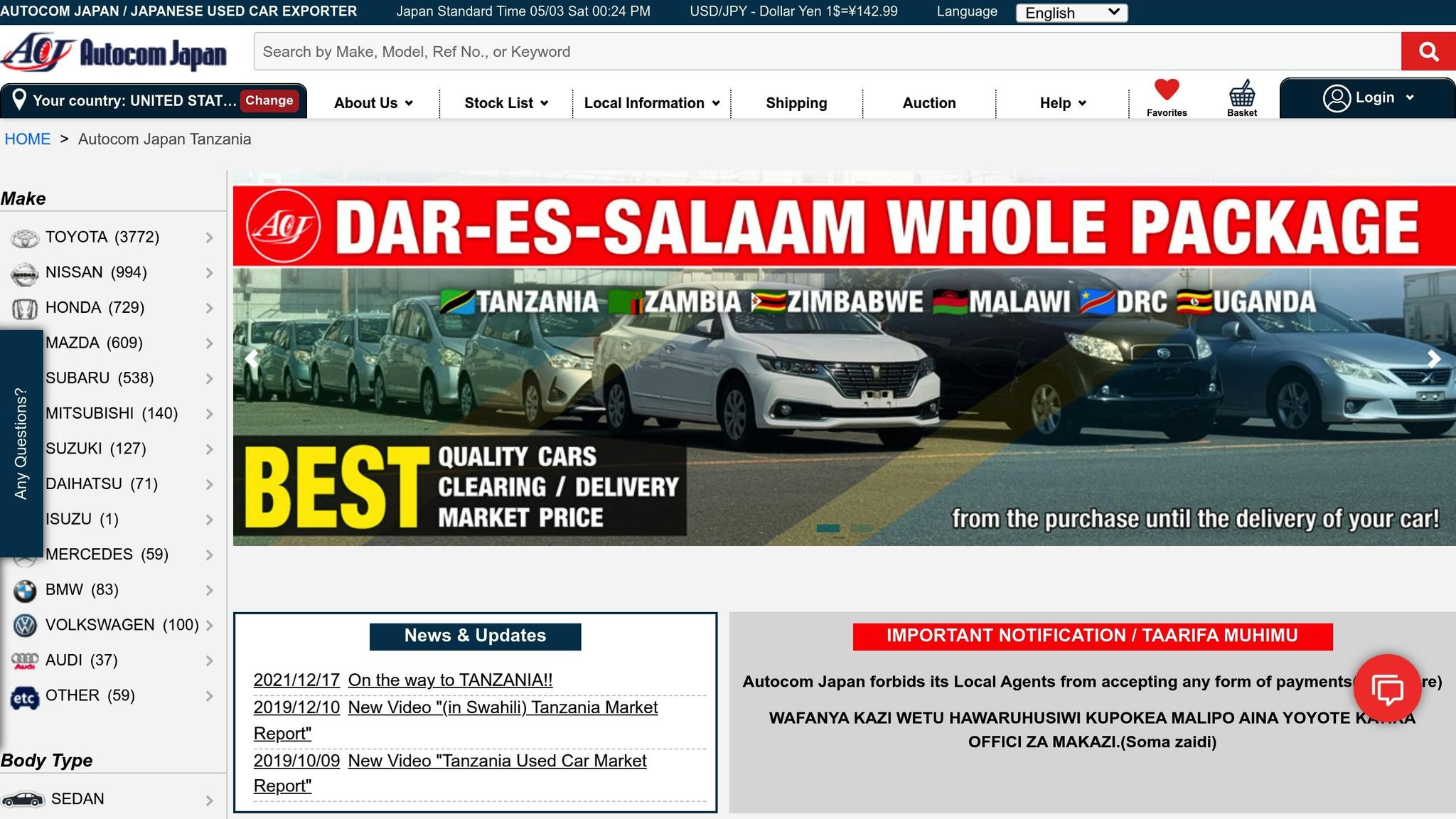Buying a car in Tanzania involves understanding import rules, taxes, and market trends. Here’s a quick summary:
- Age Limit for Imports: Cars must be 8 years old or less.
- Taxes: Import duty (25%), VAT (18%), and excise duty (0%-15% based on engine size). Total tax ranges from 45% to 65% for private cars.
- Popular Brands: Toyota, Isuzu, and Nissan dominate due to reliability and availability of spare parts.
- Costs to Consider: Include import duties, registration, insurance, and maintenance.
- Financing Options: Banks like Absa offer loans for new (up to 90% financing) and used cars (up to 80% financing).
Quick Comparison of Taxes by Engine Size:
| Engine Size | Import Duty | Excise Duty | VAT | Total Tax |
|---|---|---|---|---|
| Up to 1000cc | 25% | 0% | 20% | 45% |
| 1000cc–2000cc | 25% | 5% | 20% | 50% |
| Above 2000cc | 25% | 10% | 20% | 65% |
Tips:
- Inspect used cars carefully for mechanical issues and verify documents.
- SUVs are popular for their versatility on Tanzanian roads.
- Consider fuel efficiency and long-term maintenance costs when choosing a vehicle.
Follow these steps to budget, inspect, and register your car properly to ensure a smooth buying experience.
TANZANIA used car market statistics | AUTOCOM JAPAN

Step 1: Plan Your Budget
Budgeting is key when buying a car – there’s more to consider than just the sticker price.
Calculate Total Costs
Don’t forget to factor in import duties, registration fees, insurance, and inspection costs. These charges can vary based on the car’s engine size:
| Engine Size | Import Duty | Excise Duty | VAT | Total Tax |
|---|---|---|---|---|
| Up to 1000cc | 25% | 0% | 20% | 45% |
| 1000cc–2000cc | 25% | 5% | 20% | 50% |
| Above 2000cc | 25% | 10% | 20% | 65% |
You’ll also need to budget for one-time expenses like registration, insurance, import paperwork, and inspections. Beyond that, ongoing costs such as fuel, maintenance, annual insurance, parking, and unexpected repairs should be included in your calculations. Once you’ve tallied up these expenses, look into financing options.
Compare Loan Options
Absa Bank provides financing options for both new and used vehicles:
New Vehicle Loans:
- Up to 90% financing of the purchase price
- Maximum loan amount: TZS 500 million
- Repayment term: up to 60 months
- Lower interest rates compared to loans for used vehicles
Used Vehicle Loans:
- Up to 80% financing of the purchase price
- Maximum loan amount: TZS 200 million
- Repayment term: up to 48 months
When comparing loans, consider factors like interest rates, monthly payments, loan tenure, early repayment terms, and required documentation (e.g., ID, employment letter, pay slips, and bank statements). Calculating your debt service ratio is also crucial to ensure your monthly payments are manageable within your income.
Step 2: Know the Market
In 2025, Tanzania’s automotive market expanded by 17.4% in the first quarter, highlighting the importance of understanding its trends and dynamics.
Top-Selling Cars
Toyota holds the top spot, with Isuzu and Nissan following closely behind. These brands dominate due to their reliability, availability of parts, and strong service networks:
| Brand | Key Advantages | Popular Models |
|---|---|---|
| Toyota | Reliable service network, easy access to parts | Land Cruiser, Hilux, Corolla |
| Isuzu | Durable for commercial use, fuel-efficient | D-Max, MU-X |
| Nissan | Affordable maintenance, good resale value | Patrol, Navara |
SUVs are a key preference for Tanzanian buyers, making up 36% of used car sales. Their ability to handle both city roads and rural terrain makes them a popular choice.
2025 Market Overview
The Tanzanian used car market was valued at $41.45 million in 2025 and is expected to grow to $59.92 million by 2030. This growth reflects a mix of brand loyalty and evolving consumer needs.
Price Ranges and Availability:
- Over half (56%) of used cars are listed between $100 and $4,300.
- New passenger car sales remain low, with only 2,000–3,000 units sold per year.
- Japanese imports dominate the used car market.
Market Conditions:
Fuel prices in Dar es Salaam (as of August 2023) provide additional context for car ownership costs:
- Gasoline: TSh 3,199 ($1.30) per liter
- Diesel: TSh 2,935 ($1.20) per liter
Emerging Trends:
- Electric vehicles (EVs) are gaining traction, with 5,000 EVs registered as of April 2023.
- Online car shopping is on the rise, supported by 31.6% internet penetration.
- The government is actively encouraging investments in e-mobility.
Tanzania’s stable economy, with a projected 6% growth rate and inflation controlled at 3.3% as of March 2025, creates a favorable environment for car buyers. However, keep an eye on fuel prices and market fluctuations, as these can influence the overall cost of ownership.
Step 3: Choose New or Used
Choosing between a new or used vehicle is a crucial step in aligning with your budget and specific needs.
New Car Pros and Cons
The market for new cars in Tanzania is quite limited, with only 2,000–3,000 units sold each year. New cars come with the advantage of a full manufacturer warranty and modern features, but they also come with a much higher price tag compared to used options.
| Aspect | New Cars | Used Cars |
|---|---|---|
| Price | Much higher | Lower ($100–$4,300, 56% of used listings) |
| Warranty | Full manufacturer warranty | Often limited or nonexistent |
| Maintenance | Regular scheduled servicing | May require unexpected repairs |
| Depreciation | Rapid in the first year | More stable resale value |
Tips for Buying a Used Car
If you’re leaning toward a used car, thorough checks are essential to ensure you’re making a smart purchase.
Key Areas to Inspect for Used Cars:
-
Mechanical Condition
Hire a mechanic to thoroughly inspect critical components like:- Engine performance and compression
- Transmission functionality
- Suspension and brakes
-
Paperwork
Confirm all import documents and ownership records are in order. -
Spare Parts Availability
Research the availability and cost of spare parts. For instance, Toyota parts are generally more affordable and easier to find than Nissan parts in Tanzania.
Market Trends to Consider
The used car market is growing, driven by the rise of online platforms, increasing interest in SUVs, and strong demand for reliable imports from Japan. Focus on brands with a proven track record for reliability and a solid service network – Toyota, Isuzu, and Nissan remain popular choices in Tanzania.
Fuel Efficiency Matters
Don’t overlook fuel efficiency when evaluating used cars. Here’s a quick breakdown:
- Diesel vehicles are better for high-mileage drivers due to their fuel economy.
- Petrol vehicles usually come with lower maintenance costs.
Think about your daily driving habits and the availability of fuel in your area to make the best choice for your situation.
sbb-itb-d9186c2
Step 4: Check Documents and Car Condition
Review Legal Documents
Carefully examine all documents to avoid potential fraud or legal complications. Focus on ownership details, import papers, and the car’s service history to ensure everything checks out.
Important Documents to Review:
- Vehicle Registration Card (TLB): Includes the registration number, engine and chassis numbers, owner details, import information, and tax payment status.
- Import Documentation: Look for customs clearance forms, receipts for import duties, and port release papers.
- Service History: Review maintenance and repair records to understand how well the car has been cared for.
Red Flags to Watch For:
- Numbers on documents that don’t match.
- Foreign identification that can’t be verified.
- Payments made by someone not listed in the paperwork.
- Suspiciously structured payments, particularly near $10,000.
Once the paperwork is in order, move on to inspecting the car’s physical condition.
Complete Car Inspection
After verifying the documents, the next step is to evaluate the car itself. A thorough inspection ensures there are no hidden issues.
Inspection Checklist:
| Area to Inspect | Key Checks | Warning Signs |
|---|---|---|
| Documentation | Verify VIN and registration details | Discrepancies or unclear ownership |
| Mechanical | Check engine, transmission, and brakes | Strange noises, leaks, or smoke |
| Exterior | Inspect paint, panels, and frame | Rust or signs of previous accidents |
| Interior | Review dashboard, seats, and controls | Warning lights, odors, or excessive wear |
Steps for a Detailed Inspection:
- Document Verification and Test Drive: Confirm VIN matches, ensure the seller’s ID is valid, and check for any unpaid loans or liens. Take the car for a test drive to assess its performance.
- Mechanical and Structural Review: Examine all systems, including mechanical and electronic components, for signs of wear or damage. Look for evidence of previous accidents.
- Professional Assessment: Hire a certified mechanic to conduct a diagnostic test and provide a written report on the car’s condition.
If you notice anything unusual in the documents or during the inspection – like mismatched numbers or strange payment methods – consider it a major warning sign and halt the transaction immediately.
Step 5: Buy and Register
Once you’ve purchased your vehicle, the next step is to register it with the Tanzania Revenue Authority (TRA). This step is mandatory to legally drive your car on Tanzanian roads.
Here’s what the registration process includes:
- Apply for a registration card and license plates: Visit your local TRA office to begin the process.
- Pay the registration fees: Fees depend on your vehicle’s engine size and type.
- Obtain insurance coverage: Ensure you have the required insurance to drive legally.
Make sure to bring your customs clearance documents and proof of purchase when visiting the TRA office. Complete the application, pay the necessary fees, and secure your insurance. Once these steps are done, your vehicle is officially ready for the road.
Conclusion
This guide has walked you through the key steps involved in buying a car in Tanzania, from budgeting to registration. Careful planning ensures a smoother experience and helps you avoid potential mistakes.
Start by reviewing your budget to cover both the purchase price and ongoing maintenance expenses. Tanzania’s automotive market offers a range of options, with models like the Toyota Land Cruiser Prado, Toyota Harrier, and Nissan X-Trail being among the most popular choices.
The vehicle you choose will affect your long-term costs, so it’s worth considering options carefully. Models from brands like Toyota and Nissan are favored for their reliability and availability. Don’t forget to secure insurance to protect your investment and comply with local laws.
FAQs
What should I consider when choosing between a new or used car in Tanzania?
When deciding between a new or used car in Tanzania, it’s important to weigh factors like cost, depreciation, and features. Used cars are typically more affordable upfront and avoid the steep depreciation that new cars face in their first few years. However, they may have higher maintenance costs and fewer modern features.
On the other hand, new cars come with the latest technology, advanced safety features, and the peace of mind of a manufacturer’s warranty. They’re also less likely to require immediate repairs. If you’re considering importing a used car, be aware of local regulations, including age limits, import taxes, and inspection requirements. Carefully assess your budget, preferences, and long-term needs to make the best choice for your situation.
How do taxes and duties impact the cost of importing a car to Tanzania?
Taxes and duties play a major role in determining the total cost of importing a car to Tanzania. These fees include import duty, excise duty, and VAT, which are calculated based on the vehicle’s engine capacity. For instance, cars with engines up to 2,000cc are taxed at 50%, while those exceeding 2,000cc incur a 65% tax.
Additionally, a Railway Development Levy (RDL) of 2% of the car’s CIF (Cost, Insurance, and Freight) value is applied. These charges can significantly increase the final price, so it’s essential to factor them into your budget when planning to import a vehicle.
How can I make sure the documents for a used car in Tanzania are legitimate and error-free?
To ensure the documents for a used car are legitimate and free of errors, follow these steps:
- Verify the Vehicle Identification Number (VIN): Check that the VIN on the car matches the one on the registration certificate.
- Confirm the roadworthiness certificate: Ensure it’s up-to-date and approved by the relevant Tanzanian authorities.
- Check for Pre-shipment Verification (PVoC): If the car is imported, confirm it complies with Tanzania’s import regulations.
- Review the service history: Look for maintenance records and verify the odometer reading for accuracy.
- Match the seller’s details: Make sure the name and address on the registration document match the person selling the car.
Taking these precautions will help you avoid legal issues and ensure a smooth car-buying experience.
Related posts
- How to Check a Used Car Before Buying in Tanzania
- Car prices in Dar es Salaam
- Where to buy safe used cars in Tanzania
- What to Check Before Buying a Second-Hand Car in Tanzania




